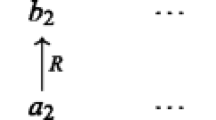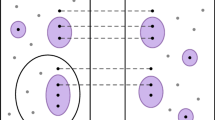Abstract
Results of Schlipf (J Comput Syst Sci 51:64–86, 1995) and Fitting (Theor Comput Sci 278:25–51, 2001) show that the well-founded semantics of a finite predicate logic program can be quite complex. In this paper, we show that there is a close connection between the construction of the perfect kernel of a \(\Pi^0_1\) class via the iteration of the Cantor–Bendixson derivative through the ordinals and the construction of the well-founded semantics for finite predicate logic programs via Van Gelder’s alternating fixpoint construction. This connection allows us to transfer known complexity results for the perfect kernel of \(\Pi^0_1\) classes to give new complexity results for various questions about the well-founded semantics \({\mathit{wfs}}(P)\) of a finite predicate logic program P.
Similar content being viewed by others
References
Andreka, H., Nemeti, I.: The generalized completeness of horn predicate logic as a programming language. Acta Cybern. 4, 3–10 (1978)
Bendixson, L.: Quelques theéorèms de la th’eorie des ensumble de points. Acta Math. 2, 415–429 (1883)
Cenzer, D., Mauldin, R.: On the Borel class of the derived set operator. Bull. Soc. Math. Fr. 110, 357–380 (1982)
Cenzer, D., Mauldin, R.: On the Borel class of the derived set operator II. Bull. Soc. Math. Fr. 111, 367–372 (1983)
Cenzer, D., Clote, P., Smith, R., Soare, R., Wainer, S.: Members of countable \(\Pi^0_1\) classes. Ann. Pure Appl. Logic 31, 145–163 (1986)
Cenzer, D., Remmel, J.B.: Index sets for \(\Pi^0_1\) classes. Ann. Pure Appl. Logic 93, 3–61 (1998)
Cenzer, D., Remmel, J.B.: \(\Pi_1^0\) classes in mathematics. In: Handbook of Recursive Mathematics, pp. 623–821. Elsevier (1999)
Cenzer, D., Remmel, J.B.: A connection between Cantor–Bendixson derivatives and the well-founded semantics of logic programs. In: ISAIM 2008, The Tenth International Symposium on Artificial Intelligence and Mathematics, Fort Lauderdale (2008)
Cenzer, D., Remmel, J.B.: Effectively closed sets. In: ASL Lecture Notes in Logic (to appear)
Denecker, M.: The well-founded semantics is the principle of inductive definition. In: Proceedings of the 6th European Workshop on Logics in Artificial Intelligence. LNAI, vol. 1489, pp. 1–16. Springer (1998)
Denecker, M., Bruynooghe, M., Marek, V.W.: Logic programming revisited: logic programs as inductive definitions. ACM Trans. Comput. Logic 2, 623–654 (2001)
Fitting, M.C.: Fixpoint semantics for logic programming–a survey. Theor. Comput. Sci. 278, 25–51 (2001)
Gelfond, M., Lifschitz, V.: The stable semantics for logic programs. In: Kowalski, R., Bowen, K. (eds.) ICLP88, pp. 1070–1080 (1988)
Hinman, P.G.: Recursion-Theoretic Hierarchies. Springer-Verlag (1978)
Kuratowski, K.: Some problems concerning semi-continuous set-valued mappings. In: Set-Valued Mappings, Selections and Topological Properties of 2X. Lecture Notes in Math, vol. 171, pp. 45–48. Springer-Verlag (1970)
Lempp, S.: Hyperarithmetical index sets in recursion theory. Trans. Amer. Math. Soc. 303, 559–583 (1987)
Marek, W., Nerode, A., Remmel, J.B.: The stable models of predicate logic programs. J. Logic Prog. 21(3), 129–154 (1994)
Schlipf, J.S.: The expressive power of the logic programming semantics. J. Comput. Syst. Sci. 51, 64–86 (1995)
Soare, R.: Recursively Enumerable Sets and Degrees. Springer-Verlag (1987)
Smullyan, R.M.: First-order Logic. Springer-Verlag (1968)
Tarski, A.: A lattice-theoretical theorem and its applications. Pac. J. Math. 5, 285–309 (1955)
Van Gelder, A.: The alternating fixpoints of logic programs with negation. In: ACM Symposium on Principles of Database Systems, pp. 1–10 (1989)
Van Gelder, A.: The alternating fixpoints of logic programs with negation. J. Comput. Syst. Sci. 47, 185–221 (1993)
Van Gelder, A., Ross, K.A., Schlipf, J.S.: The well-founded semantics for general logic programs. J. ACM 38(3), 620–650 (1991)
Author information
Authors and Affiliations
Corresponding author
Additional information
Cenzer was partially supported by the NSF grant DMS-652372 and Remmel by the NSF grant DMS-0654060.
Rights and permissions
About this article
Cite this article
Cenzer, D., Remmel, J.B. A connection between the Cantor–Bendixson derivative and the well-founded semantics of finite logic programs. Ann Math Artif Intell 65, 1–24 (2012). https://doi.org/10.1007/s10472-012-9294-x
Published:
Issue Date:
DOI: https://doi.org/10.1007/s10472-012-9294-x




